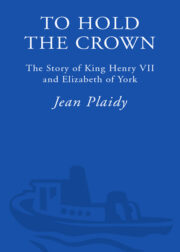When he wakened one morning to find the castle surrounded, he was horrified. It could mean only one thing. He was about to be arrested and the only reason could be implication with Suffolk. When he saw the Calais garrison were stationed outside the castle, his first thought was that he would hold out. He had the necessary stores, men and arms to withstand a long siege and he would do so until he knew why his castle was being besieged.
He did not have to wait long. A messenger came to tell him that Sir Thomas Lovell, the Chancellor of the Exchequer, was aboard the ship, which lay at anchor, and he wished to have a private word with Sir James Tyrrell. He came from the King and he was in fact commanding Sir James to come to meet him.
It was no use asking the messenger for what purpose, but he had brought with him a safe conduct.
Tyrrell guessed that the King had discovered what Suffolk was doing and that he was going to be accused of complicity. He sent for his son.
“Thomas,” he said, “this messenger comes from Sir Thomas Lovell, who wishes to have speech with me.”
“You should not go, Father. You should not leave the castle.”
“I shall, my son. I have safe conduct and while I am gone I leave you in charge of the castle. Hold the siege and take no orders that do not come from me. Do you understand?”
Thomas said he did.
So Sir James left with the messenger and went aboard to meet Sir Thomas Lovell.
As soon as he was ushered into his presence he knew he had been foolish to come, for Lovell lost no time in accusing Tyrrell, in the name of the King, of high treason.
“This is monstrous,” said Tyrrell. “I am entirely guiltless.”
“It will be necessary for you to return to England with me.”
“I was promised safe conduct. I am not afraid of answering my accuser but I shall go back to the castle to put my affairs in order there. Then I will return to England to answer these false charges.”
“You will at once send a message to your son. The castle is to be surrendered without delay.”
“I shall send no such message.”
“I think you will, Sir James. If you do not you will be promptly thrown into the sea.”
“On whose orders?”
“From one who must not be disobeyed.”
“You mean . . . the King?”
“I did not say that. I have orders to take you back to England. . . . I was not told whether you were to be alive or dead . . . only to bring you at any cost.”
“Let me go back to the castle. Let me make ready to leave.”
Lovell shook his head. “The castle is to surrender. You will send a message to your son.”
He signed to two strong men who came forward at once and seized Tyrrell.
“Are you prepared to sign that order? The sea is rough today. Accoutred as you are you would have little chance of surviving.”
They really mean it, thought Tyrrell. What is behind all this? Why did not the King send me a simple command to return? I should have done so. I have nothing to fear from him. Or . . . have I? No, he could not. He would not dare. What I could tell . . .
He was seized with a fit of shivering. He seemed to see Henry Tudor’s cold eyes staring at him.
He said: “I will sign the order for the surrender of the castle. Only my signature will satisfy my son.”
Lovell smiled and bowed his head.
He summoned a messenger. “Take this order at once to the castle. Thomas Tyrrell and John Dighton are to join us here on the ship without delay.”
“My son knows nothing of . . . of anything you may be accusing me of.”
“We have our orders,” smiled Lovell. “And we intend to obey them to the letter.”
In a very short time Thomas Tyrrell and John Dighton joined Sir James on the ship.
Before he reached England Tyrrell knew that he had been a fool to leave the castle. If he had not done so he would be there now . . . defending it against the Calais garrison. He had been tricked. He should never have obeyed the summons to see Lovell. And now what? He knew he was going to be accused with Suffolk. He had committed no treason. It was true that Suffolk had visited him but they had not even talked of treason. If he had a fair trial he could prove this. Suffolk would exonerate him for Suffolk was a man of honor even though he was impulsive and hotheaded.


"To Hold the Crown: The Story of King Henry VII and Elizabeth of York" отзывы
Отзывы читателей о книге "To Hold the Crown: The Story of King Henry VII and Elizabeth of York". Читайте комментарии и мнения людей о произведении.
Понравилась книга? Поделитесь впечатлениями - оставьте Ваш отзыв и расскажите о книге "To Hold the Crown: The Story of King Henry VII and Elizabeth of York" друзьям в соцсетях.